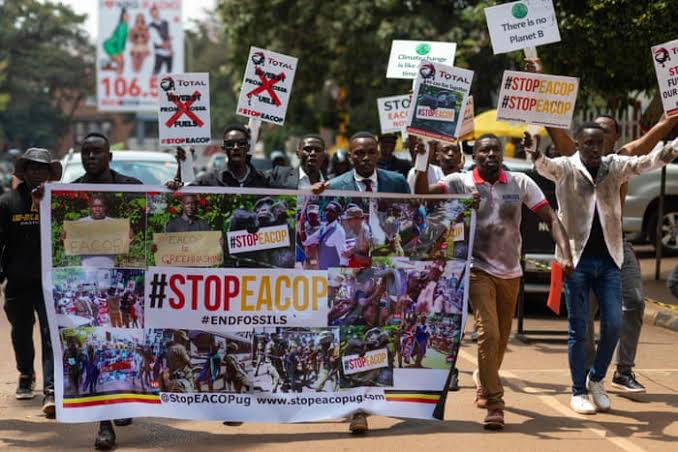Uganda has defended its controversial oil pipeline project, saying it will use cutting-edge technology to ensure safety and environmental protection. However, the project has faced fierce opposition from activists and communities who fear its impacts on people, wildlife and climate.
The East African Crude Oil Pipeline (EACOP) is a $4 billion project that will transport oil from Uganda’s western fields to a port in Tanzania. It will be the longest heated pipeline in the world, covering 1,443 km and requiring 80 MW of solar and hydropower to keep the oil at 80 degrees Celsius.
The project is backed by China’s Sinosure, Eximbank and ICBC, as well as French oil giant Total and China National Offshore Oil Corporation (CNOOC). Uganda expects to start oil production in 2025 and reach a peak of 230,000 barrels per day.
The Ugandan government has touted the economic benefits of the project, saying it will create jobs, boost revenues and transfer skills. It has also published new details of the pipeline’s safety features, such as a sophisticated monitoring system, a coating factory and real-time satellite connectivity.
“Uganda can be proud of its place at the cutting edge of pipeline technology with EACOP showing how committed the country is to develop its oil and gas assets responsibly, openly and profitably,” said Dozith Abeinomugisha, director in charge of midstream developments at the Petroleum Authority of Uganda (PAU).
However, the project has also sparked widespread protests and lawsuits from local and international groups who say it will violate human rights, threaten biodiversity and worsen the climate crisis. According to the StopEACOP coalition, the pipeline will displace more than 12,000 families, affect 2,000 km of protected areas and emit 34 million tonnes of carbon dioxide per year.
On November 20, activists declared a “global day of action” to stop EACOP and urged Chinese institutions to withdraw their support. Demonstrations took place in several cities, including Washington DC, Kampala, Dar es Salaam, Kinshasa, Tshwane, Paris and London. In Kampala, police arrested seven StopEACOP activists, drawing condemnation from local NGOs.
The protesters also accused EACOP of disturbing and disrespecting the graves of locals and ancestors, a claim that the company denied. They called for a shift to renewable energy sources and a respect for the rights of affected communities.
“EACOP is a disaster for the people and the planet. It will fuel conflict, corruption and human rights abuses. It will destroy ecosystems and livelihoods. It will lock Africa into a fossil fuel future that we cannot afford. We demand that EACOP be stopped and that the Chinese government and companies withdraw from this destructive project,” said Landry Ninteretse, Africa team leader at 350.org, one of the groups behind the StopEACOP campaign.
The fate of the project now depends on the decisions of the financiers, the courts and the governments involved. While Uganda and Tanzania have signed agreements to proceed with EACOP, the final investment decision has been delayed several times due to legal and environmental challenges. The project also faces opposition from the African Union, the European Union and the United Nations.
Despite the uncertainties, the first 100 km of pipe sections have been manufactured in China and are expected to arrive in Tanzania within weeks. The PAU said it expected EACOP to lay the first sections around mid-2024.
As the world grapples with the climate emergency and the need to transition to clean energy, the EACOP project poses a test for the region’s development and sustainability. While the project promises economic gains for some, it also risks social and environmental costs for many. The voices of the people and the planet must be heard and respected in this crucial debate.
Source: Energy Voice



